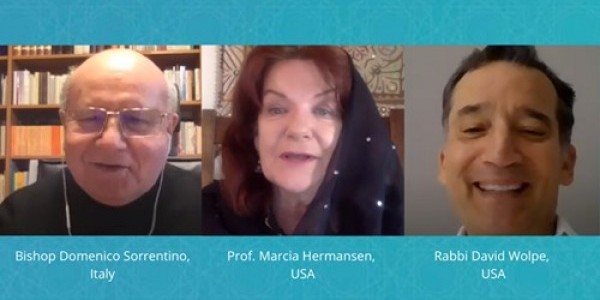Coronaspection: Introspection VIII
24/06/2020 | Na stronie od 24/06/2020

Elijah Interfaith Institute, Israel. From: Tablet
Alon Goshen-Gottstein, Executive Director of the Elijah Interfaith Institute, Israel, is the author of The Jewish Encounter with Hinduism: History, Spirituality, Identity.
There is a special power in the coming together of religious leaders in their diversity to deliver a message at a given point in time, especially a time of global crisis. Forty important voices are taking part in this project. I am grateful to editors of Tablet magazine for their eagerness to feature the project in its entirety.
Together, we set out to answer seven questions:
-
What have been your greatest challenges in dealing with the present Corona crisis?
-
Corona is bringing out a lot of fear in people. How does one deal with fear? What spiritual advice could you offer to people struggling with fear?
-
Corona has forced people into solitude. How should time be spent in solitude? Many people do not have experience and habits that would allow them to make the most of this opportunity. What advice could they be given?
-
Corona brings about deprivation. We are deprived of our freedom, of our habits. We lose things, and even more so- people we love. How does one deal with all forms of deprivation?
-
What does Corona teach us about our interconnectivity? What are spiritual applications that people can practice consciously?
-
Corona forces us into our own protective space, but it also calls us to solidarity. How to practice solidarity? What are teachings that support solidarity? What actions express solidarity? What can one do to express solidarity, even from within the confines of one's home and protection?
-
Many people say the world will be different after this Corona crisis. What blessings do you see Corona bringing to the world? How can the world be different, for the better, following this crisis?
One of the most important conceptual threads that runs through the project is the recognition that for all its hardships, the coronavirus is in some way also a blessing. To uncover that blessing we may need the eyes of the other and the experience of another spiritual tradition and how it is able to find blessing even in hardship.
Introspection 8
Bishop Domenico Sorrentino, Italy
Bishop Domenico Sorrentino is theologian by training and serves as Bishop of Assisi. He offers us a view of Corona and its challenges from Italy. Pain and solidarity are channeled through prayer and praise of God in the building in which St. Francis spent weeks before his death. Here he delivered the canticle of creatures. If St. Francis were to look upon us he would recommend us to recite the canticle. Just as one can speak of sister death, we can speak of brother coronavirus. For all the pain and tragedy, crisis is also a grace. There are many positive elements that emerge from the crisis, including discovering the power of family and prayer in a family context, following the Jewish precedent. It is a time for deepening education and prayer. The suffering creates a broader sense of solidarity, and a broader sense of community, that extends beyond Christianity to members of other faiths. The interview concludes with a presentation in English and then a chanting in the original Italian of St. Francis’ celebrated hymn of creatures.
Prof. Marcia Hermansen, USA
Prof. Marcia Hermansen is Director of the Islamic World Studies Program and Professor in the Theology Department at Loyola University Chicago and a thought leader in the American Muslim community. Taking place at the beginning of Ramadan, the interview examines various ways in which COVID-19 impacts Ramadan observance, and which hold potential and promise, as well as presenting challenges. Religion moves from the mosque to the home. This opens up possibilities for including the entire family in certain celebrations as well as for greater gender balance. The home becomes the place of retreat that is often a component of Ramadan celebrations, again opening up opportunities for women to participate in ways they typically do not. The potential contribution of religion to coping with various challenges of the moment is considered both from its outward and its inner aspects. Stability of religious habits provides the kind of security that can help relieve anxiety. The stability of ritual is also an opportunity for the raising of the intuition to God consciousness which provides us with the ultimate perspective for addressing the variety of challenges presented by the pandemic.
Rabbi David Wolpe, USA
Rabbi David Wolpe is Rabbi of Temple Sinai, Los Angeles, and has been named the most influential rabbi in the United States by Newsweek Magazine. “Corona provides opportunities for doing things I might have never had a chance to do”. It produces a mixture of the sacred and the profane. The Rabbi’s responsibility is to calm people, to assure them things are going to be OK. To avoid anxiety, detach yourself from constant listening to the news. Prayer is powerful, no matter what your theological convictions are. Consider this time not as a pause, but as a preparation. How will you be different when this is over? We are in this together. And this togetherness echoes the depth of Jewish experience. Our interconnectedness is not such between humans but between all living creatures, which leads to my own vegetarianism.
Więej: